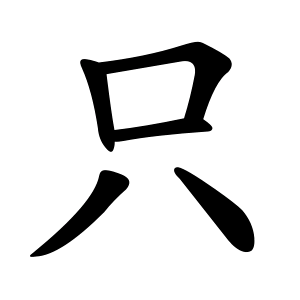只
- only, merely, just, solely;
Also a measure word for animals or single items.
Etymology
Phono-semantic compound:
口 (입 구, “mouth”) — semantic, representing speech or expression.
八 (여덟 팔, “eight; divide, separate”) — phonetic, giving the sound 지 and implying a limited or restricted quantity (as in “only”).
The character originally depicted an open mouth emitting a single sound, later extended to mean a single utterance or a single thing — hence “only” or “merely.”
Usage in Korean
단지(但只) — merely, only.
다만(只) — just, only.
아기(阿只) — archaic phonetic loan for “baby” (아기), historically written with 只 as phonetic for gi.
Today, 只 is mainly recognized through Chinese vocabulary or Hanja compounds, but its native Korean reading gi survives fossilized in this word.
Additional notes
In classical Chinese, 只 was used interchangeably with 祇 and 衹, functioning as an adverb meaning “only” or “merely.”
《論語》: 「君子務本,本立而道生。孝弟也者,其為仁之本與?只此而已。」
“The gentleman attends to the root; once the root is established, the Way arises. Filial piety and brotherly respect — only this, and nothing more.”
Here, 只此而已 means “only this and nothing else.”
In Buddhist Chinese, 只 also appeared in transliterations and expository phrases emphasizing simplicity or singular devotion (e.g., 只心 “one-heartedly”).
